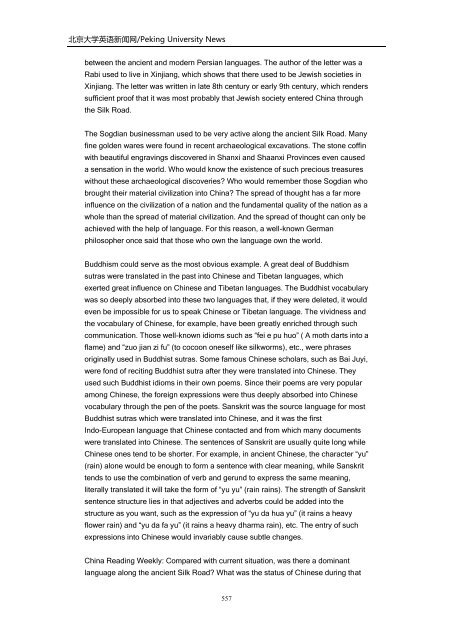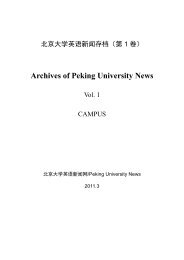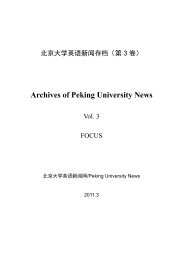Archives of Peking University News - PKU English - 北京大学
Archives of Peking University News - PKU English - 北京大学
Archives of Peking University News - PKU English - 北京大学
Create successful ePaper yourself
Turn your PDF publications into a flip-book with our unique Google optimized e-Paper software.
<strong>北京大学</strong>英语新闻网/<strong>Peking</strong> <strong>University</strong> <strong>News</strong><br />
between the ancient and modern Persian languages. The author <strong>of</strong> the letter was a<br />
Rabi used to live in Xinjiang, which shows that there used to be Jewish societies in<br />
Xinjiang. The letter was written in late 8th century or early 9th century, which renders<br />
sufficient pro<strong>of</strong> that it was most probably that Jewish society entered China through<br />
the Silk Road.<br />
The Sogdian businessman used to be very active along the ancient Silk Road. Many<br />
fine golden wares were found in recent archaeological excavations. The stone c<strong>of</strong>fin<br />
with beautiful engravings discovered in Shanxi and Shaanxi Provinces even caused<br />
a sensation in the world. Who would know the existence <strong>of</strong> such precious treasures<br />
without these archaeological discoveries? Who would remember those Sogdian who<br />
brought their material civilization into China? The spread <strong>of</strong> thought has a far more<br />
influence on the civilization <strong>of</strong> a nation and the fundamental quality <strong>of</strong> the nation as a<br />
whole than the spread <strong>of</strong> material civilization. And the spread <strong>of</strong> thought can only be<br />
achieved with the help <strong>of</strong> language. For this reason, a well-known German<br />
philosopher once said that those who own the language own the world.<br />
Buddhism could serve as the most obvious example. A great deal <strong>of</strong> Buddhism<br />
sutras were translated in the past into Chinese and Tibetan languages, which<br />
exerted great influence on Chinese and Tibetan languages. The Buddhist vocabulary<br />
was so deeply absorbed into these two languages that, if they were deleted, it would<br />
even be impossible for us to speak Chinese or Tibetan language. The vividness and<br />
the vocabulary <strong>of</strong> Chinese, for example, have been greatly enriched through such<br />
communication. Those well-known idioms such as ―fei e pu huo‖ ( A moth darts into a<br />
flame) and ―zuo jian zi fu‖ (to cocoon oneself like silkworms), etc., were phrases<br />
originally used in Buddhist sutras. Some famous Chinese scholars, such as Bai Juyi,<br />
were fond <strong>of</strong> reciting Buddhist sutra after they were translated into Chinese. They<br />
used such Buddhist idioms in their own poems. Since their poems are very popular<br />
among Chinese, the foreign expressions were thus deeply absorbed into Chinese<br />
vocabulary through the pen <strong>of</strong> the poets. Sanskrit was the source language for most<br />
Buddhist sutras which were translated into Chinese, and it was the first<br />
Indo-European language that Chinese contacted and from which many documents<br />
were translated into Chinese. The sentences <strong>of</strong> Sanskrit are usually quite long while<br />
Chinese ones tend to be shorter. For example, in ancient Chinese, the character ―yu‖<br />
(rain) alone would be enough to form a sentence with clear meaning, while Sanskrit<br />
tends to use the combination <strong>of</strong> verb and gerund to express the same meaning,<br />
literally translated it will take the form <strong>of</strong> ―yu yu‖ (rain rains). The strength <strong>of</strong> Sanskrit<br />
sentence structure lies in that adjectives and adverbs could be added into the<br />
structure as you want, such as the expression <strong>of</strong> ―yu da hua yu‖ (it rains a heavy<br />
flower rain) and ―yu da fa yu‖ (it rains a heavy dharma rain), etc. The entry <strong>of</strong> such<br />
expressions into Chinese would invariably cause subtle changes.<br />
China Reading Weekly: Compared with current situation, was there a dominant<br />
language along the ancient Silk Road? What was the status <strong>of</strong> Chinese during that<br />
557




